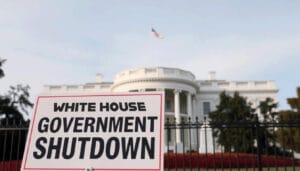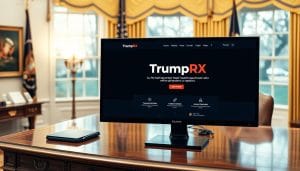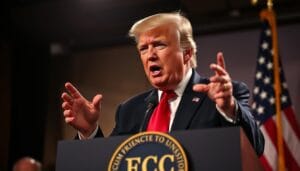Trump Seeks FCC Control, Threatens Broadcast Licenses
Explore the latest on Trump’s maneuver for FCC regulation power and his threats to revoke media broadcast licenses amid growing concerns.
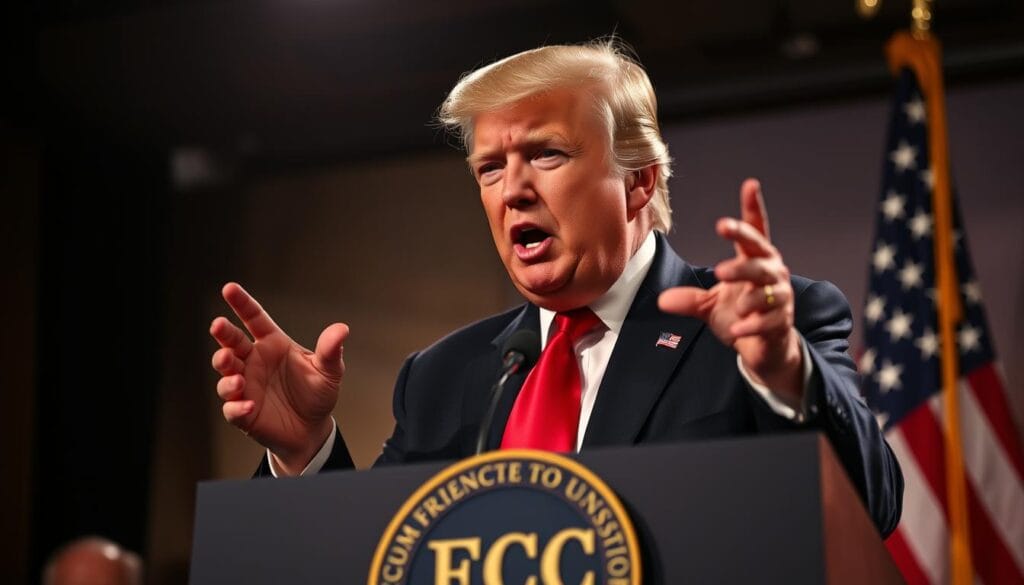
Trump Seeks FCC Control
Trump Seeks FCC Control: Donald Trump wants to penalize negative coverage by urging the Federal Communications Commission to revise how stations maintain their licenses. This move could clash with Congress’s watchdog role. For 91 years, the FCC has been independent, and no president has ever fired a commissioner.
This situation raises concerns about media censorship and political interference. Courts are now deciding how much power the president can have over independent agencies. If the courts allow more control, the FCC might act more like a Cabinet department, affecting media freedom.
Recent disputes over network coverage have shown the tension between politics and regulation. These issues include threats to broadcast licenses and investigations into major networks. The situation is urgent for stations, owners, and viewers.
Local affiliates hold the licenses, but national brands are also subject to FCC scrutiny. The question is whether freedom of the press will be protected or if media censorship will increase under political pressure.
Trump Seeks FCC Control: Key Takeaways
- The push to revisit broadcast licenses tests the FCC’s tradition of independence.
- Trump Seeks FCC Control, Threatens Broadcast Licenses Amid Rising Clashes Over Coverage.
- Courts could expand the reach of the presidency, potentially shifting government control of the media.
- Local affiliates hold licenses, but national networks face regulatory pressure.
- Freedom of the press and claims of media censorship are at the center of the fight.
- Ongoing cases and rulings may redefine the extent to which political interference is permitted.
- High-profile disputes, noted in national reporting, signal escalating risks for broadcasters.
What’s at Stake: FCC Independence, First Amendment Rights, and Government Control of Media
The debate over FCC independence is a genuine one. It affects what we watch and hear every day. When regulators face pressure, the line between oversight and political interference can get fuzzy. This makes First Amendment rights feel less secure.
Why the FCC was designed to be independent from presidential influence
Congress made the FCC independent to keep it away from the White House. This way, no president can control the media directly. It protects viewpoint neutrality and prevents political interference that could distort coverage.
Presidents from Franklin D. Roosevelt to Richard Nixon tried to influence policy. But the FCC’s design is key. It protects speech and supports First Amendment rights, even during times of heightened tension.
How licensing authority and “public interest” standards affect broadcasters
The FCC grants and renews licenses, using the public interest standard as its guiding principle. This standard is essential for local communities. Stations plan their content, staff, and investments in accordance with these rules.
Reviews of big deals and newsroom policies show the impact of these standards. This is covered in a press freedom debate.
Potential impacts on freedom of the press and claims of media censorship
When public officials hint at penalties, broadcasters may be cautious. Even slight hints of political interference can chill reporting. Lawyers now review segments that editors once handled.
Courts have ruled that the coercion of private outlets can violate First Amendment rights. Legal battles over agency power, such as those involving the Universal Service Fund and antitrust actions, demonstrate how rules can impact speech. This is seen in a recent case overview on federal agency power.
The broader ripple effects on journalism ethics and newsroom decisions
Editors make tougher decisions when government control seems possible. Producers might avoid certain stories or live segments if a license renewal is near.
Newsrooms also change their guidelines. They document fairness, add ombuds reviews, and codify counterspeech. These steps aim to meet the public interest standard while protecting FCC independence.
Trump Seeks FCC Control, Threatens Broadcast Licenses
Public pressure on broadcasters is growing as Trump seeks to gain control of the FCC and threatens their licenses. Executives are torn between legal risks and keeping the audience’s trust. Debates over media censorship, political interference, and journalism ethics are now part of the nightly news.
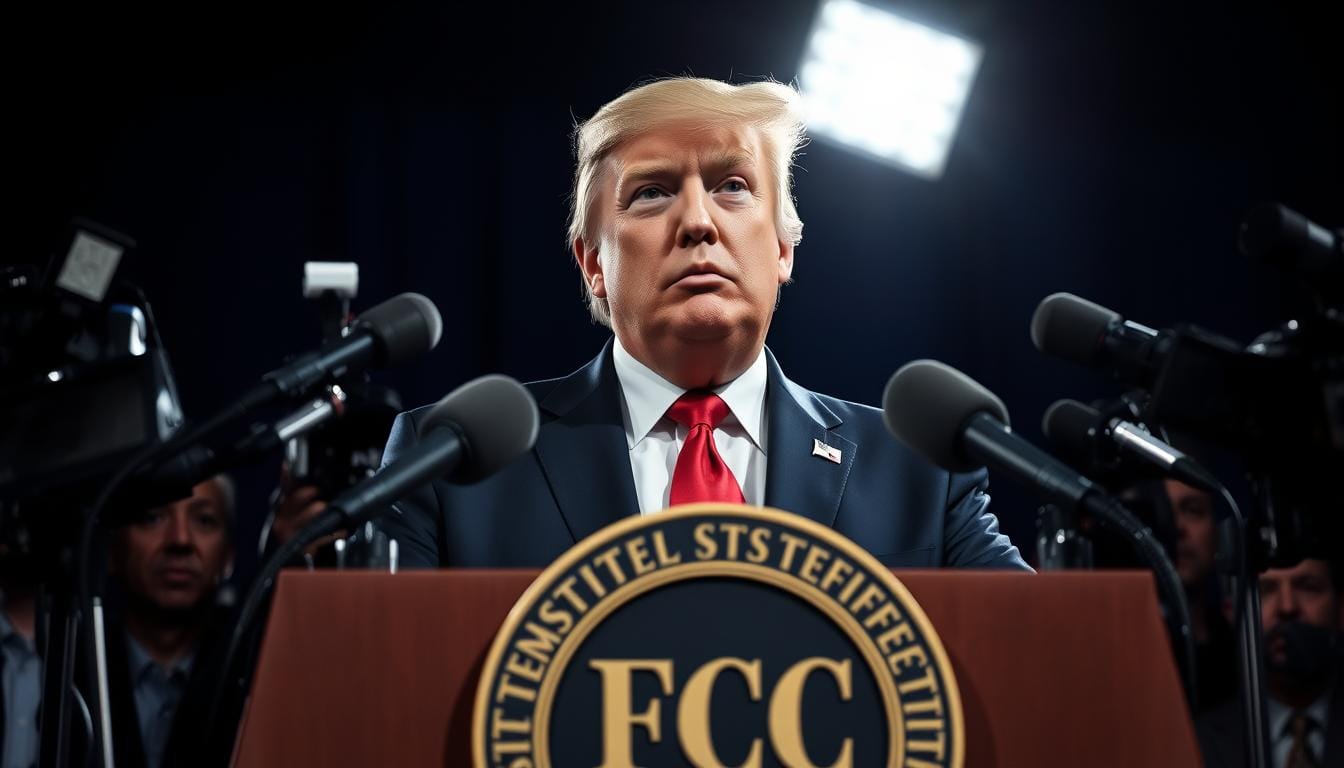
Calls to punish unfavorable broadcasters and the Kimmel controversy
The controversy started with comments linked to a suspected shooter of Charlie Kirk. These remarks sparked anger in a late-night segment. Disney, ABC’s parent, briefly suspended Jimmy Kimmel, then reversed the decision.
Critics warned that punishing comedy bits could chill free speech. This episode fueled claims that Trump wants to control the FCC to steer coverage and threaten licenses.
Broadcasters see this as a test of journalism ethics under pressure. When programming choices appear to be influenced by political interference, audiences take notice. A closer look at the FCC’s authority and recent steps is in this piece on broadcast license threats and regulatory leverage. It demonstrates how media censorship concerns align with the “public interest” standard.
Chairman Brendan Carr’s posture and denials amid public pressure
FCC Chair Brendan Carr told companies there would be “a lot of work” ahead if they didn’t act. Yet, he denied threatening any license. His praise from Donald Trump contrasted with his denial, keeping pressure high on networks like ABC and owners such as Disney and Nexstar.
Policy experts say even a hint of license jeopardy shapes newsroom decisions. When threats loom, journalists face a tougher calculus that blends ethics with survival. This is where media censorship and political interference can blur, even without a formal proceeding.
Bipartisan concerns: reactions from Ted Cruz and media watchdogs
Sen. Ted Cruz warned that cheering punitive moves today could silence conservatives tomorrow. Media watchdogs on both sides said the rhetoric risks normalizing political interference. Legal scholars believe the pattern could be tested in court if escalated.
Advocates like Michael Sozan and Thomas Berry see this as a live experiment in power and restraint. They focus on whether Trump seeks FCC control in ways that effectively threaten broadcast licenses while framing actions as routine oversight.
Industry risk calculus: avoiding conflict with an activist FCC
Networks and station groups plan around mergers, renewals, and compliance, avoiding public fights with an activist FCC. Nexstar’s pursuit of deals while managing hundreds of stations shows why companies steer clear of provocation. In this climate, concerns about media censorship rise as executives weigh the risk of political interference against their duty to shareholders.
For newsrooms, the strategy is defensive: document decisions, keep lawyers close, and separate opinion from reporting. This results in a tighter lane for creative work and tougher calls on satire, booking, and timing. It’s a real-world stress test for journalism ethics as leadership gauges how far regulators may go.
| Pressure Point | Who Feels It | Regulatory Trigger | Business Impact | Editorial Impact |
|---|---|---|---|---|
| License Renewal Signals | Broadcast Affiliates (ABC, NBC, CBS, FOX) | “Public interest” reviews | Revenue uncertainty, higher legal spend | Constrained segments to avoid complaints |
| Merger and Acquisition Scrutiny | Nexstar, Tegna, Disney | Transaction approvals | Deal delays, renegotiated terms | Self-censorship on sensitive coverage |
| Public Threats and Denials | Network Executives | Informal pressure campaigns | Brand risk, advertiser jitters | Careful framing to avoid media censorship claims |
| Political Messaging | On-air Talent and Producers | Viewer complaints, petitions | Sponsor pullbacks, slot reshuffles | Edits and delays to reduce political interference risk |
The Legal Battleground: Unitary Executive Theory, FCC Regulations, and Court Challenges
The debate over a president’s power over independent agencies is heating up. It involves FCC rules, court battles, and media control limits. The First Amendment and broadcast regulations are also in effect.
The administration’s push to gain firing authority over independent commissioners
Advisers want to let the president fire commissioners at will. They say Article II demands direct control. This move aims to link policy changes to the White House.
Supporters argue that it enhances accountability and ensures FCC rules are enforced. Critics fear it could stifle free speech. If commissioners fear being fired, news outlets might be more cautious.
How a Supreme Court ruling could reshape independent agencies like the FCC
The Supreme Court will decide on removal limits for agency leaders. A ruling favoring the president could change the FCC’s role. This could impact rulemaking and speech policies.
Historically, the FCC has struck a balance between content and legal protections. A shift could alter this balance. This is why the stakes are so high, as seen in this public-interest enforcement history.
Support and opposition: Heritage and Cato perspectives vs. constitutional cautions
Zack Smith of Heritage views broader removal power as a form of democratic accountability. Thomas Berry of Cato wants to align agencies with the executive. Mitchel Sollenberger of the University of Michigan warns of erosion in checks and balances.
These views set up inevitable court battles over executive power. Sollenberger fears government control could harm free speech.
Enforcement risks: coercion claims, standing to sue, and judicial checks
Threats tied to licensing can be seen as coercion. But, plaintiffs need standing and resources to sue. Large companies often hesitate due to fear of retaliation.
When probes or penalties follow heated rhetoric, First Amendment rights are at issue. Courts will have to decide where oversight ends and coercion starts. Reporting by national outlets, including ongoing legal news updates, suggests this will be a key test.
Trump Seeks FCC Control Conclusion
The debate reveals one clear thing: attempting to control broadcasters and tighten the FCC’s grip is a new approach. The Kimmel incident, Disney’s brief ban, and Brendan Carr’s stance highlight the impact of licensing threats. These actions erode the press’s freedom under political pressure, casting doubt on the FCC’s independence.
The Supreme Court’s decision on presidential power over FCC commissioners is key. If the court allows more executive control, the FCC could become a political tool. This could lead to censorship and media control. Groups like the Heritage Foundation and the Cato Institute view this as an opportunity for accountability. But scholars like Mitchel Sollenberger fear it could lead to authoritarianism.
The future of local and national media is in jeopardy. If the FCC’s protection is removed, media outlets might self-censor. This could affect what we see and hear. For more on this, see this report on broadcaster scrutiny.
The goal is to protect press freedom while maintaining political oversight. The FCC’s independence is at stake. The outcome will shape what we watch and hear, guided by law or politics.
Trump Seeks FCC Control FAQ
Why was the FCC designed to be independent from presidential influence?
Congress established the FCC 91 years ago to ensure its independence from the White House. No president has ever fired an FCC commissioner. This distance helps maintain fairness and protects free speech.
How do broadcast licenses and the “public interest” standard shape what stations do?
The FCC grants and renews licenses, ensuring that stations serve the public. This affects what they broadcast and how they conduct their operations. If stations think they might lose their license, they might change what they show to avoid trouble.
What are the First Amendment risks in efforts to revoke or threaten broadcast licenses?
Legal experts suggest that using licenses to control content may be unlawful. It could deter journalists and reporters from speaking out, which is detrimental to freedom of the press.
How could these pressures change newsroom decisions?
Editors and producers might be more careful about what they show. They might omit parts that could be offensive or avoid specific topics. This is because they don’t want to face trouble from the government.
What happened in the Jimmy Kimmel controversy involving Disney and ABC?
Following Jimmy Kimmel’s comments, FCC Chairman Brendan Carr stated that the FCC might take action. Disney briefly stopped Kimmel, then resumed him. This sparked discussions about censorship and the FCC’s role.
Did Chairman Brendan Carr threaten broadcast licenses?
Carr said the FCC could act in several ways, but later clarified it wasn’t a threat. Critics, such as Thomas Berry, believe it was a veiled threat. The FCC didn’t ask for public comments.
How did Republicans like Ted Cruz respond?
Ted Cruz said threatening Kimmel might seem right to some, but could harm others. Donald Trump supported Carr and suggested taking action against broadcasters he didn’t like. This made people worry more about government control.
Why do media companies avoid fighting an activist FCC?
Companies don’t want to risk trouble with the FCC. The FCC can affect their licenses and operations. This makes them cautious and worried about government control.
What is the administration’s unitary executive strategy regarding the FCC?
The White House wants to be able to easily fire FCC commissioners. They think the courts should agree with this. If they do, the FCC might not be as independent as it is now.
How could a Supreme Court ruling change independent agencies?
If the Court lets presidents fire commissioners, the FCC could change. It might start making decisions based on politics more. This could be detrimental to broadcasters and freedom of the press.
Who supports and who opposes expanding presidential control over the FCC?
Some, like Zack Smith, think the president should have more power. Others, like Mitchel Sollenberger, are worried it could lead to less freedom. They think it could make the government too strong.
What are the enforcement risks and litigation hurdles?
There are signs of government pressure, but taking it to court is hard. It requires individuals with the legal authority to sue and the financial resources to do so. The courts would have to decide if this is against the law.
Did past presidents pressure the FCC?
Yes, past presidents, such as Roosevelt and Nixon, quietly attempted to influence the FCC. Today, the threats are more open and could affect what we see and hear.
What’s at stake for freedom of the press and journalism ethics?
The FCC’s independence and the First Amendment are at risk. If the president has more power, journalists might be more careful. This could make it harder for us to know what’s going on.
How do FCC regulations and broadcast licensing interact with social media and content distribution?
The FCC doesn’t control most online speech, but its decisions can affect how we get news. What happens in one area can impact what we see and hear everywhere else.
What should broadcasters watch in the months ahead?
They should keep an eye on the Supreme Court case, any FCC actions, and the statements made by commissioners. These changes could impact how the FCC operates and how media companies conduct their business.


